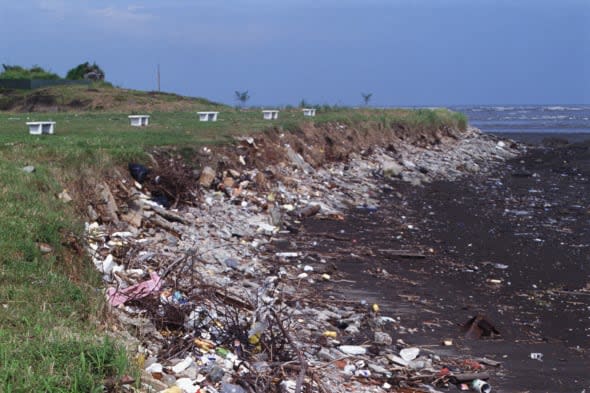Britain's beaches are being ruined by wet wipes

The UK's beaches are becoming increasingly littered with wet wipes that have been flushed down the toilet, conservationists have warned.
The number of wet wipes found in the Marine Conservation Society's annual "Great British beach clean" increased by some 50 per cent in a year as more people use them instead of traditional toilet paper, to remove make- up and to apply fake tan, the charity said.
The annual survey also revealed a 6.4 per cent increase in overall beach litter between 2013 and 2014, prompting the charity to call on the government to do more to tackle rubbish in the country's seas and on its beaches. Words: PA.
More than 300 beaches around the UK were cleaned and surveyed by 5,349 volunteers over a weekend last September, with 2,457 bits of litter collected for every kilometre of coastline cleaned - up from an average of 2,309 in 2013.
The most commonly collected type of rubbish was pieces of plastic, while 10 per cent of the litter collected was plastic drink bottles and aluminium drinks cans. Eleven per cent was rubbish from commercial and recreational fishing.
Volunteers also found some unusual items including a colostomy bag, a plastic hand, a piping gun nozzle, a bra strap and, on one beach, nine pairs of shoes of various sizes.
An average of 35 wet wipes, which do not disintegrate when flushed down the toilet, were found for every kilometre of beach cleaned in 2014, up from 23 of the little square cloths per kilometre the previous year.
MCS beachwatch officer Charlotte Coombes said the UK's sewers were not built to cope with wet wipes - which have also been causing a problem elsewhere in the world.
"When flushed they don't disintegrate like toilet paper, and they typically contain plastic so once they reach the sea, they last for a very long time.
"They can cause blockages in our sewers and then everything else that has been flushed down the loo can either back up into people's homes, or overflow into rivers and seas.
"Overflows also happen during excessive rainfall, or if the plumbing hasn't been connected up properly, meaning the wrong pipes are heading straight to the sea.
"That's when we find sewage-related debris, including wet wipes, on the beach," she said.
The charity is calling for a national marine litter action plan to address the main sources of rubbish in the UK's seas, from the public, fishing, shipping and sewage-related debris.
Measures to tackle the problem could include a national deposit scheme to pay people for returning drinks bottles and cans and better recycling or disposal facilities for fishermen.
In Wales, two and a half times more litter was collected per kilometre of beach than the national average, an increase of 46% on 2013 to its highest level in 21 years of the annual survey, while England saw the density of rubbish rise by 10% to new highs.
Beaches in the South West had the highest amounts of rubbish in England, but litter levels dropped on both the east and west coasts of northern England, and there was an 8% fall in rubbish per kilometre of beach surveyed in Scotland, the survey found.
Litter levels also appear to be declining in Northern Ireland.
Related articles:
CCTV will catch drivers who drop litter from cars
15 beaches in Britain that look more like the Caribbean
Cornwall beach left with no sand after massive storm
Climbers of Everest being ruined by devastating pollution, say Sherpas







